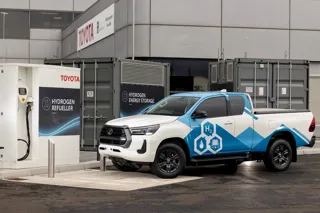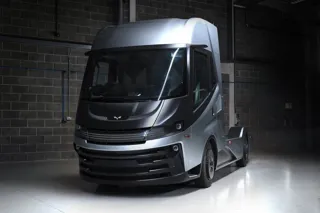A JCB digger, powered by a hydrogen combustion engine, will soon be on UK roads and building sites following recent government approval.
The UK government has given special dispensation, under a vehicle special order, that allows JCB, the British construction equipment manufacturer, to test and use its hydrogen-powered backhoe loader on UK roads.
The vehicle special order given by the transport secretary allows JCB to test its new hydrogen-powered machine on the public highway.
Technology and decarbonisation minister Jesse Norman said: “From cars to construction sites, industry has a vital role in decarbonising our economy and creating green jobs and prosperity.
“JCB’s investment in greener equipment is a great example of how industry can make this happen, using alternative fuels to generate sustainable economic growth.”
JCB chairman, Lord Bamford, said: “Securing this vehicle special order from the Department for Transport is an important first step in getting JCB machines that are powered by hydrogen combustion engines to and from British building sites using the public highway.
“It’s an endorsement that JCB is on the right path in pursuit of its net zero ambitions.”
He continued: “JCB’s hydrogen-powered backhoe loader is a world first in our industry, a digger with a purpose-engineered internal combustion engine that uses hydrogen gas as the energy source.
“It’s a real breakthrough – a zero CO2 fuel providing the power to drive the pistons in an internal combustion engine, a technology that’s been around for over 100 years, a technology that we are all familiar with.”
Hydrogen is just one of the many ways that the UK government is looking to accelerate decarbonisation.
The recent announcement of second phase of the Tees Valley Hydrogen Hub builds on previous commitments to best explore how hydrogen can be utilised as an alternative fuel, whether that be through the use of hydrogen fuel cells on road or hydrogen internal combustion engines for off-road construction machinery.
The work seen as part of the hub in Tees Valley will work to address challenges such as providing refuelling infrastructure at scale and integrating that within a wider decarbonised energy network.
























Login to comment
Comments
No comments have been made yet.